高考英语口语:含know口语的用法
- 格式:docx
- 大小:37.07 KB
- 文档页数:2
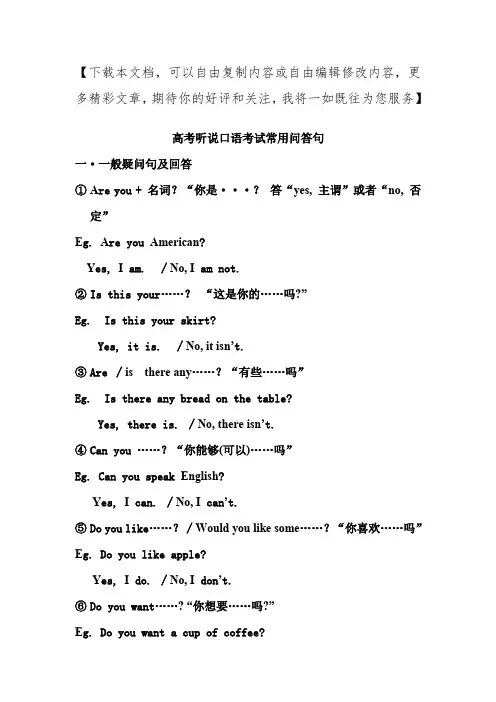
【下载本文档,可以自由复制内容或自由编辑修改内容,更多精彩文章,期待你的好评和关注,我将一如既往为您服务】高考听说口语考试常用问答句一·一般疑问句及回答①A re you + 名词?“你是···?答“yes, 主谓”或者“no, 否定”E g. A re you American?Y es, I am. ∕No, I am not.②Is this your……?“这是你的……吗?”Eg. Is this your skirt?Yes, it is. ∕No, it isn’t.③Are ∕is there any……?“有些……吗”Eg. Is there any bread on the table?Yes, there is. ∕No, there isn’t.④Can you ……?“你能够(可以)……吗”Eg. Can you speak English?Y es, I can. ∕No, I can’t.⑤Do you like……?∕Would you like some……?“你喜欢……吗”E g. Do you like apple?Y es, I do. ∕No, I don’t.⑥Do you want……? “你想要……吗?”E g. Do you want a cup of coffee?Y es, please. ∕No, thanks.⑦Have you ……?“你已经……了吗”Has she had breakfast?Y es, she has. ∕No, she hasn’t.⑧Is that all? “就这些了吗?”That’s all.总结:一般疑问句特点是把谓语动词或者助动词提到主语之前,回答的时候,先回答yes或者no,接着主语加谓语动词或者助动词即可。
二. 特殊疑问句。
(1)when did∕will you……?“你(将)什么时候……?”根据实际情况回答,要有时间状语。
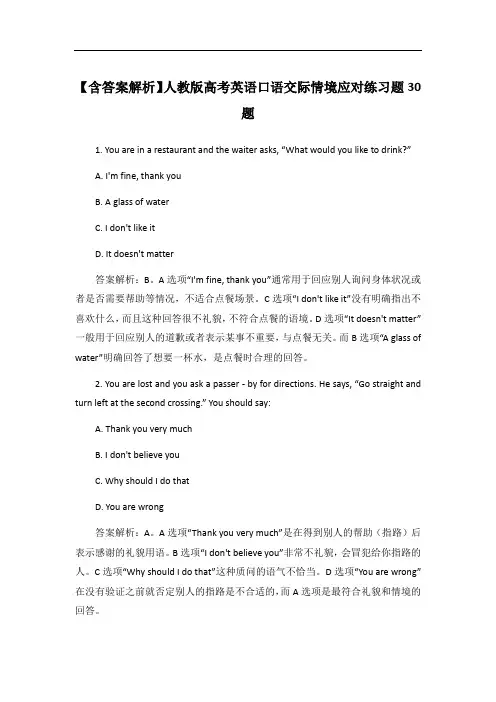
【含答案解析】人教版高考英语口语交际情境应对练习题30题1. You are in a restaurant and the waiter asks, “What would you like to drink?”A. I'm fine, thank youB. A glass of waterC. I don't like itD. It doesn't matter答案解析:B。
A选项“I'm fine, thank you”通常用于回应别人询问身体状况或者是否需要帮助等情况,不适合点餐场景。
C选项“I don't like it”没有明确指出不喜欢什么,而且这种回答很不礼貌,不符合点餐的语境。
D选项“It doesn't matter”一般用于回应别人的道歉或者表示某事不重要,与点餐无关。
而B选项“A glass of water”明确回答了想要一杯水,是点餐时合理的回答。
2. You are lost and you ask a passer - by for directions. He says, “Go straight and turn left at the second crossing.” You should say:A. Thank you very muchB. I don't believe youC. Why should I do thatD. You are wrong答案解析:A。
A选项“Thank you very much”是在得到别人的帮助(指路)后表示感谢的礼貌用语。
B选项“I don't believe you”非常不礼貌,会冒犯给你指路的人。
C选项“Why should I do that”这种质问的语气不恰当。
D选项“You are wrong”在没有验证之前就否定别人的指路是不合适的,而A选项是最符合礼貌和情境的回答。
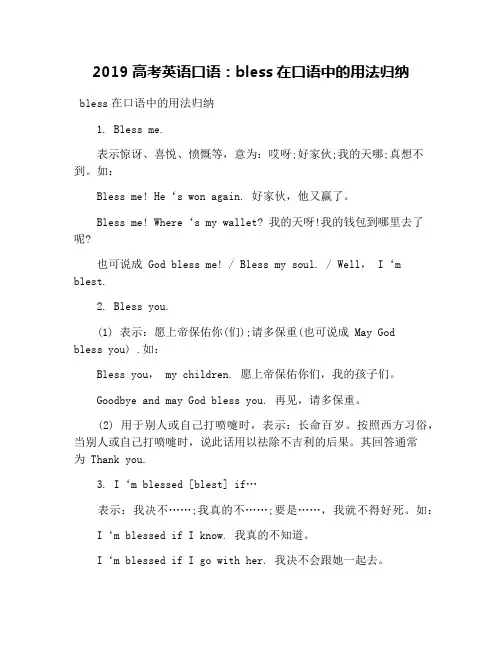
2019高考英语口语:bless在口语中的用法归纳
bless在口语中的用法归纳
1. Bless me.
表示惊讶、喜悦、愤慨等,意为:哎呀;好家伙;我的天哪;真想不到。
如:
Bless me! He‘s won again. 好家伙,他又赢了。
Bless me! Where‘s my wallet? 我的天呀!我的钱包到哪里去了呢?
也可说成 God bless me! / Bless my soul. / Well,I‘m blest.
2. Bless you.
(1) 表示:愿上帝保佑你(们);请多保重(也可说成 May God
bless you) .如:
Bless you, my children. 愿上帝保佑你们,我的孩子们。
Goodbye and may God bless you. 再见,请多保重。
(2) 用于别人或自己打喷嚏时,表示:长命百岁。
按照西方习俗,当别人或自己打喷嚏时,说此话用以祛除不吉利的后果。
其回答通常
为 Thank you.
3. I‘m blessed [blest] if…
表示:我决不……;我真的不……;要是……,我就不得好死。
如:
I‘m blessed if I know. 我真的不知道。
I‘m blessed if I go with her. 我决不会跟她一起去。
I‘m blessed if I said so. 我要是这样说了,我就不得好死。
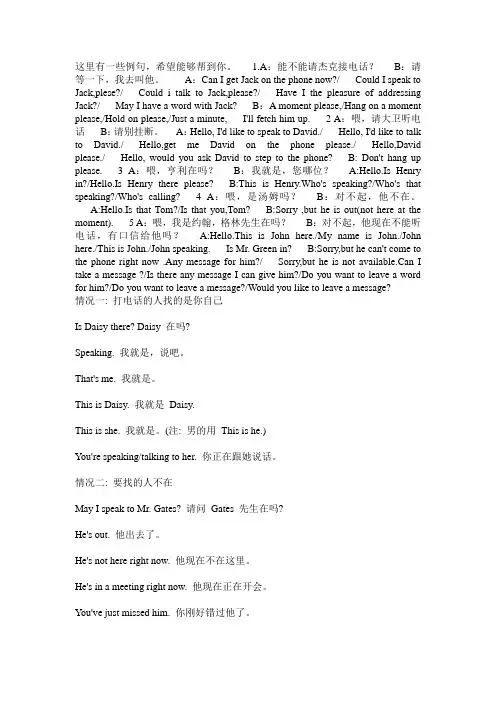
这里有一些例句,希望能够帮到你。
1.A:能不能请杰克接电话? B:请等一下,我去叫他。
A:Can I get Jack on the phone now?/ Could I speak to Jack,plese?/ Could i talk to Jack,please?/ Have I the pleasure of addressing Jack?/ May I have a word with Jack? B:A moment please,/Hang on a moment please,/Hold on please,/Just a minute, I'll fetch him up. 2 A:喂,请大卫听电话 B:请别挂断。
A:Hello, I'd like to speak to David./ Hello, I'd like to talk to David./ Hello,get me David on the phone please./ Hello,David please./ Hello, would you ask David to step to the phone? B: Don't hang up please. 3 A:喂,亨利在吗? B:我就是,您哪位? A:Hello.Is Henry in?/Hello.Is Henry there please? B:This is Henry.Who's speaking?/Who's that speaking?/Who's calling? 4 A:喂,是汤姆吗? B:对不起,他不在。
A:Hello.Is that Tom?/Is that you,Tom? B:Sorry ,but he is out(not here at the moment). 5 A:喂,我是约翰,格林先生在吗? B:对不起,他现在不能听电话,有口信给他吗? A:Hello.This is John here./My name is John./John here./This is John./John speaking. Is Mr. Green in? B:Sorry,but he can't come to the phone right now .Any message for him?/ Sorry,but he is not available.Can I take a message ?/Is there any message I can give him?/Do you want to leave a word for him?/Do you want to leave a message?/Would you like to leave a message?情况一: 打电话的人找的是你自己Is Daisy there? Daisy 在吗?Speaking. 我就是,说吧。
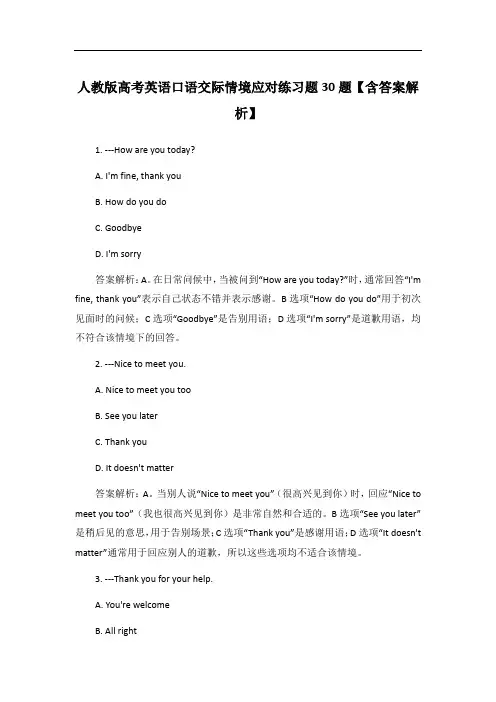
人教版高考英语口语交际情境应对练习题30题【含答案解析】1. ---How are you today?A. I'm fine, thank youB. How do you doC. GoodbyeD. I'm sorry答案解析:A。
在日常问候中,当被问到“How are you today?”时,通常回答“I'm fine, thank you”表示自己状态不错并表示感谢。
B选项“How do you do”用于初次见面时的问候;C选项“Goodbye”是告别用语;D选项“I'm sorry”是道歉用语,均不符合该情境下的回答。
2. ---Nice to meet you.A. Nice to meet you tooB. See you laterC. Thank youD. It doesn't matter答案解析:A。
当别人说“Nice to meet you”(很高兴见到你)时,回应“Nice to meet you too”(我也很高兴见到你)是非常自然和合适的。
B选项“See you later”是稍后见的意思,用于告别场景;C选项“Thank you”是感谢用语;D选项“It doesn't matter”通常用于回应别人的道歉,所以这些选项均不适合该情境。
3. ---Thank you for your help.A. You're welcomeB. All rightC. That's rightD. It's a pity答案解析:A。
当别人表达感谢时,“You're welcome”(不客气)是最常见的回应。
B选项“All right”可表示同意或还好的意思;C选项“That's right”表示那是正确的;D选项“It's a pity”表示很遗憾,都不符合回应感谢的情境。
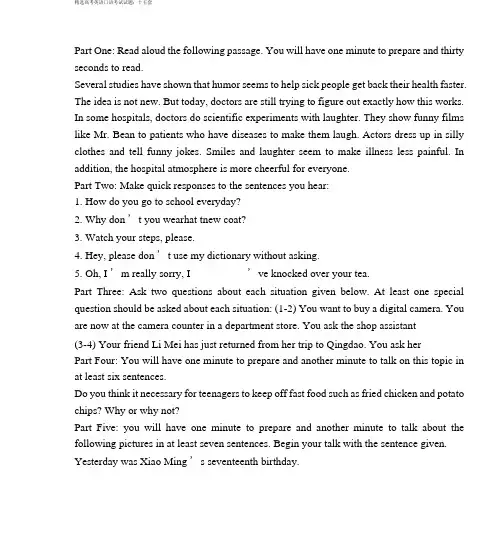
精选高考英语口语考试试题:十五套Part One: Read aloud the following passage. You will have one minute to prepare and thirty seconds to read.Several studies have shown that humor seems to help sick people get back their health faster. The idea is not new. But today, doctors are still trying to figure out exactly how this works. In some hospitals, doctors do scientific experiments with laughter. They show funny films like Mr. Bean to patients who have diseases to make them laugh. Actors dress up in silly clothes and tell funny jokes. Smiles and laughter seem to make illness less painful. In addition, the hospital atmosphere is more cheerful for everyone.Part Two: Make quick responses to the sentences you hear:1.How do you go to school everyday?2.Why don ' t you wearhat tnew coat?3.Watch your steps, please.4.Hey, please don ' t use my dictionary without asking.5.Oh, I ' m really sorry, I ' ve knocked over your tea.Part Three: Ask two questions about each situation given below. At least one special question should be asked about each situation: (1-2) You want to buy a digital camera. You are now at the camera counter in a department store. You ask the shop assistant(3-4) Your friend Li Mei has just returned from her trip to Qingdao. You ask herPart Four: You will have one minute to prepare and another minute to talk on this topic in at least six sentences.Do you think it necessary for teenagers to keep off fast food such as fried chicken and potato chips? Why or why not?Part Five: you will have one minute to prepare and another minute to talk about the following pictures in at least seven sentences. Begin your talk with the sentence given. Yesterday was Xiao Ming ' s seventeenth birthday.Part 1:: Read aloud the following passage. You will have one minute to prepare and thirty seconds to read.Everyone has his own way of relaxing. Perhaps the most popular way is to participate in sports. There are team sports, such as baseball, basketball and football. There are individual sports, also, such as golf and swimming. In addition, hiking, skiing, and mountain climbing have a great attraction for people who like to be outdoors.Not everyone who enjoys sports likes to participate in them. Many people prefer to be spectators, either by attending the games in person, or watching them on television. When there is an important baseball game or boxing match it is almost impossible to get tickets, everybody wants to attend.Part 2:: Make quick responses to the sentences you hear:1.How are things with you?2.I must apologize for my behavior yesterday.3.We ' re having an outing on Saturday. I hope you can make it.4.Which TV programme are you most interested in?5.I wonder if you would agree with me.Part Three: Ask two questions about each situation given below. At least one special question should be asked about each situation: (1-2) One of your friends asks you to go to a concert with him. Ask him two questions about the concert.(3-4) You have moved to a new residential area recently and are not familiar with the neighbourhood. Ask your next-door neighbour two questions aboutPart One: Read aloud the following passage. You will have one minute to prepare and thirty seconds to read.Charlie s mother noticed a key on the table. Charlie, “ she called, father left this key here today. Please hurry and take it to him. Run all the way and don t stop for anything. ”Charlie went running down the path from his house. He started playing with the key, throwing it high in the air and jumping up to catch it again.Suddenly the key fell through his fingers, dropping to the ground, and rolled out of sight. He felt ashamed when he told his father about the lost key. Charlie ' s father was angry and said, “You are very careless, my son. The next time you have something important to carry, put it in your pocket.Part Two: Make quick responses to the sentences you hear:1.May I speak to Mr. Johnson, the hotel manager?2.Could I have two tickets for the Lion King for Friday night?3.You ought not to be smoking here, sir.4.If I were you, I ' d sent him an email.5.You ' ve been doing a very good job in organizing the party. Part Three: Ask two questions about each situation given below. At least one special question should be asked about each situation: (1-2) One of your classmates seems upset about something. Ask him two questions to show your concern.(3-4) You are now working for the Students Union to enroll volunteers for the coming international conferences. One of your schoolmates wants to be a volunteer. Ask him two questions.第四套Part One: Read aloud the following passage. You will have one minute to prepare and thirty seconds to read.At last, after what seemed to us an age, the lifeboat reached the man and two of the sailors pulled him on board. This was not at all easy, for the sea was rather rough. Then the sailors began to row back to the ship again.The lifeboat was raised out of the water and the rescued man, wrapped in a blanket, was helped out on to the deck. Leaning on the arm of the ship doctor, but still able to walk in spite of his terrible experience, he was led off to the ship ' s hospital. As he passed along the deck, everyone cheered loudly.Part Two: Make quick responses to the sentences you hear:1.What do you think of taking a summer English course in Britain?2.How is your cousin? I haven ' t seen her for ages.3.I don ' t know how to use this fax machine.4.Can you tell me what time it is now?5.I regret that I quarreled with my roommate last night.Part Three: Ask two questions about each situation given below. At least one special question should be asked about each situation: (1-2) You want to buy a new pair of sports shoes. Ask the shop assistant two questions about the shoes.(3-4) Your friend has just transferred to a new school. Ask your friend two questions about the school.第五套Part One: Read aloud the following passage. You will have one minute to prepare and thirty seconds to read.Working long hours can greatly increase the risk of suffering injury or illness, a recent risk study says. Workers who do overtime were 61% more likely to become hurt or ill, once factors such as age and so on were taken into account. And working more than 12 hours a day raised the risk by more than a third, one of the universities in Chicago found. According to their report, risk increased with longer working hours, not just in dangerous jobs, but in all types of work.Part Two: Make quick responses to the sentences you hear:1.Sorry to trouble you, but do you happen to know when the lecture begins?2.What do you think of the film directed by the young director?3.I will get my doctor ' s degree next week.4.What is Hangzhou most famous for?5.A new chain shop of the shopping mall will open soon in our community.Part Three: Ask two questions about each situation given below. At least one special question should be asked about each situation:(1-2) Your famous schoolmate is going to see a new film. He invites you to go with him. You ask him two questions about this.(3-4) Your class has a new comer from another school this term. You ask the new comer two questions.第六套Part 1:: Read aloud the following passage. You will have one minute to prepare and thirty seconds to read.The new Harry Potter book HarryPotter and the Half-Blood Prince sold an astonishing 6.9 million copies in its first 24 hours, breaking the record held by the previous release. “ HarryPotter and the Half-Blood Prince ” averaged better than 250,000 sales per hour, more than most books sell in a lifetime. Some other writers, even the most popular ones of adult fiction, sell no more than 20,000 books in the first week of sale.Part 2:: Make quick responses to the sentences you hear:1.My name is Li Xiaoming. Nice to meet you.2.What have you been busy with these days?3.Can you help me move into my new apartment tomorrow?4.I really must be going now, because I have classes in the early morning.5.Children should spend more time outdoors and less time watching TV.Part Three: Ask two questions about each situation given below. At least one special question should be asked about each situation:(1-2) One of your relatives had an accident on her way home. You ask two questions about it. (3-4) Henry wants to further his studies in a vocational school. Ask him two questions about this.第七套Part 1:: Read aloud the following passage. You will have one minute to prepare and thirty seconds to read.Indians are the world biggest bookworms, reading on average 10.7 hours a week, twice as long as Americans, according to a new survey.The NOP World Culture Score index surveyed 30,000 people in 30 countries from December 2004 to February 2005. Experts said the desire to read could explain India ' highs figures. Time spent on reading meant fewer hours watching TV and listening to the radio - India cam fourth last in both. The survey saw China take second place and the Philippines take third in average hours a week, spent reading books, newspapers and magazines.Part 2:: Make quick responses to the sentences you hear:1.1 m sorry, but you areeallyr making too much noise!2.You look so upset! What ' s the matter with you?3.Mary. I ' ve got the first prize in the municipal speech contest!4.What do you think of the fairy tale Beauty and Beast?5.There is not much milk in the refrigerator.Part Three: Ask two questions about each situation given below. At least one special question should be asked about each situation:(1-2) You work as a receptionist at a hotel. One customer called to book a room. Ask two questions about it.(3-4) You were put in a new class and you tried hard to build up a good relationship with your classmates, but failed. Ask your class teacher for help.第八套Part One: Read aloud the following passage. You will have one minute to prepare and thirty seconds to read.A rich young man decided to do some diving in the sea, so he bought a rubber suit, and took some lessons at a diving school. Then one day, he walked into the water and began to explore the bottom of the sea.He suddenly saw a man waving his arms and legs around wildly near the bottom of the sea. He was only wearing a bathing suit.The rich young man was very surprised to see him, so he took out aplastic notebook and a special pencil and wrote “ What are you doing?The other man took the pencil and wrote “ Drowning! ”1.Would you like to try some of the cakes my mum made.2.I don ’t think that film is interesting.3.This is nice, but it ' s too expensive. Could you make it 30 yuan?4.Wendy, come downstairs and help in the kitchen.5.How often do you usually go shopping?Part Three: Ask two questions about each situation given below. At least one special questionshould be asked about each situation:(1-2) You plan to visit Tibet during your summer vacation and one ofyour classmates has been there. Ask him for advice on your trip. (3-4)You are going to write an article on space flight, so you want to borrow some reference book from the library. Ask the librarians for help.第九套Part 1:: Read aloud the following passage. You will have one minute to prepare and thirty seconds to read.British potato farmers were taking to the streets for the expression“ couch potato ” to be removed from the Oxford English Dictionary, for it harms the image of the vegetable. The British Potato Organization wants the Dictionary to replace the expression with the term “ couchslouch ” . Kathy Race, head of marketing at the Organization, said,“ We are trto get rid of the image that potatoes are bad for you. The potato has been criticized in the past. " The Dictionary says “ couchpotato ” started asAmerican, meaning “ a person who spends a great deal of time watching television. ”Part 2:: Make quick responses to the sentences you hear:1.Could you tell me how to find some books on English grammar?2.What do you prefer, action movies or dramas?3.I can ' t concentrate on my work these days.4.How long is the flight from Shanghai to Beijing?5.You ' ve got a great ear for music.Part 3:ee: Ask two questions about each situation given below. At least one special question should be asked about each situation:(1-2) You and Your classmates are talking about a robbery which happened in a bank last night. Ask two questions about it.(3-4) Your English teacher is introducing a very good English programme, Studio Classroom, to you. Ask the teacher two questions about it.第十套Part 1:: Read aloud the following passage. You will have one minute to prepare and thirty seconds to read.One U.S. company said on August 10 that it wants to send two touristson a trip around the moon at a cost of $500 million per ticket. Space Adventures Company, which has already sent two citizens on separate trips into space, says it has researched and identified more than a thousand customers, who are interested, with the necessary wealth for a moon shot as early as 2008. The trip around the moon would last between 8 and 21 days, depending on whether the travelers make a stop at the International Space Station.Part 2:: Make quick responses to the sentences you hear:1.Hello, this is Mary speaking. Is Peter there?2.What do you usually have for breakfast?3.Make sure you lock the door when you leave.4.We will have a school excursion to Hangzhou soon.5.What if your mum knows that you told a lie?Part 3:ee: Ask two questions about each situation given below. At least one special question should be asked about each situation:(1-2) Imagine the famous sportsman Liu Xiang has made a speech in your school. You ask him two questions.(3-4) You want to apply for a library card. You ask the librarian two questions.第H^一套Part One: Read aloud the following passage. You will have one minute to prepare and thirty seconds to read.To make an Olympic champion takes millions of young people around the world to be inspired to choose Olympic sport.I ' mdelighted we have with us today representatives of the next generation. We ’ reserious about inspiring young people. And thanks to London ’ s multi-cultural mix of 200 nations, they also represent the youth of the world. Their families have com from every continent. They practice every religion and every faith. What unites them in London, their love of sport and their heartfelt dream of bringing the Olympic Games to our city.Part Two: Make quick responses to the sentences you hear:1.Thank you so much for your timely help.2.What you said yesterday really hurt me.3.Would you mind not talking so loudly in class?4.What do you like reading in your spare time?5.I failed the final examination and was scolded by my parents.Part Three: Ask two questions about each situation given below. At least one special question should be asked about each situation: (1-2) Your friend Li Ming has just come back from the English summer Camp in Canada. Ask him two questions about it.(3-4) It is your mother ' s birthday tomorrow and you have noaboutidea what to buy as a birthday gift. Ask your friend for advice.第十二套Part 1:: Read aloud the following passage. You will have one minute to prepare and thirty seconds to read.Police are looking for robbers who stole valuable diamonds from the jewelry display at the City Center yesterday evening during the annualGold Exhibition. The owner reported that a necklace estimated to be worth $1.5 million was taken by a young couple. A witness at the scene said that a couple in their early twenties caught her eye because they seemed too young to be interested in sun expensive jewelry. In her version of the story, the pair were dressed in clothing and hairstyles that seemed too casual for the rather formal atmosphere of the jewelry show.Part 2:: Make quick responses to the sentences you hear:1.Lucy, you look nice with that blouse today. It goes well with your skirt.2.What do you think of my new bicycle?3.Is there anything I can do for you?4.I don ’ t feel well. I want to go home.5.I think video games are really harmful for our middle-school students.Part 3:ee: Ask two questions about each situation given below. At least one special question should be asked about each situation:(1-2) Your aunt looks young and healthy. Ask her two questions about how to keep young.(3-4) John is now at the Lost and Found. The clerk asks him two questions about his lost wallet. 第十三套Part 1:: Read aloud the following passage. You will have one minute toprepare and thirty seconds to read.If you ' re not sure whether you want to say yes or no, then say you an answer later, and refuse to discuss it further. This gives you time to decide and to prepare yourself to say no if necessary. Use body language to give your words more authority: stand up straight, straighten your -it makes you feel and therefore sound more confident. If a request is reasonable but you don ' want to do it, then offer an alternative, for example, “ I don ' t have time on Saturday, but I could do it one night next week. ”Part 2: : Make quick responses to the sentences you hear:1. It ' s really hot today, isn2. What do you think of learning Japanese as a second language?3. Don ' t forget to buy a hamburger for me.4. Look, what on earth are you doing? The classroom is so messy.5. I haven ' finishedt my homework, because I felt extremely tired last night.Part Three: Ask two questions about each situation given below. At least one special question should be asked about each situation: (1-2) You are not well. You go to see a doctor. The doctor asks you two questions about your problem.(3-4) You wan to borrow a book from the library. Ask the librarian two questions about it. 第十四套Part One: Read aloud the following passage. You will have one minute to prepare and thirty seconds to read.People do get hurt in “ adventuresports ” and the most dangerous is climbing, which kills eight people a year. But it is not always obvious which activities are dangerous. For instance, two people die every year in hanggliding accidents, but the same number are killed by badminton, whereas six people a year die in fishing accidents! So " exciting isn ”? t always the same as “ dangerous This ” . is even more true when you consider the activities of everyday life. Many more people die due to accidents in the home than from sports of any kind. Part Two: Make quick responses to the sentences you hear:6. It s nice of you to show me round your school.7. What about taking Bus 104 to the Shanghai Railway Station?8. I ’ m sorry. I have to leave now. I have to catch the last bus.shoulders and look at the person. If you ' re talking on the phone, stand u t it?9.How did you enjoy the concert last night ?10.I wonder if I could use your mobile phone.Part Three: Ask two questions about each situation given below. At least one special question should be asked about each situation: (1-2) Your friend is inviting you to see a film. Ask your friend two questions about it.(3-4) You have a toothache and want to make an appointment to see Dr. Brown. The nurse asks you two questions.第十五套Part One: Read aloud the following passage. You will have one minute to prepare and thirty seconds to read.Teenagers who don ' get up in the morning are brighter and more successful.A study of students ' sleep by researchers in the USA foundnagersthatteewho get up early are often tired and can ' t concentrate in class.“ Youngchildren love to get up early but teenagers have a different biological clock, “ says a professor of Brown University. Her research showed that teenagers naturally go to sleep and wake up later than normal -for good biological reasons.Now many American schools have changed that start of their morning classes from 7.30 to 8.30 or even 9.00.Part Two: Make quick responses to the sentences you hear:1.(telephone ring) Hello, may I speak to Mr. Smith?2.I ’ m sorry that I forget to bring the book here.3.I ’ d love you to come to my birthday party.4.Why not have another cup of tea?5.You ' re busy. Is there anything I can do for you?Part Three: Ask two questions about each situation given below. At least one special question should be asked about each situation: (1-2) You are in your English teacher ' office,s asking the teacher twoquestions about English learning.(3-4) You have a new desk mate Bob. You want to get to know him. Ask him two questions.。
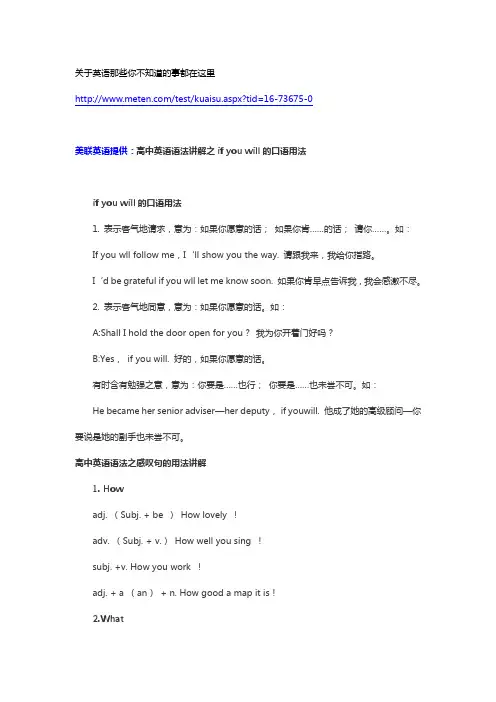
关于英语那些你不知道的事都在这里/test/kuaisu.aspx?tid=16-73675-0美联英语提供:高中英语语法讲解之if you will的口语用法if you will的口语用法1. 表示客气地请求,意为:如果你愿意的话;如果你肯……的话;请你……。
如:If you wll follow me,I‘ll show you the way. 请跟我来,我给你指路。
I‘d be grateful if you wll let me know soon. 如果你肯早点告诉我,我会感激不尽。
2. 表示客气地同意,意为:如果你愿意的话。
如:A:Shall I hold the door open for you?我为你开着门好吗?B:Yes,if you will. 好的,如果你愿意的话。
有时含有勉强之意,意为:你要是……也行;你要是……也未尝不可。
如:He became her senior adviser—her deputy,if youwill. 他成了她的高级顾问—你要说是她的副手也未尝不可。
高中英语语法之感叹句的用法讲解1. Howadj. (Subj. + be )How lovely !adv. (Subj. + v.)How well you sing !subj. +v. How you work !adj. + a (an)+ n. How good a map it is!2.Whata (an)(+ adj.)+ n. What a rude man !(+ adj.)+ n. (可数名词复数)What lovely flowers !(+ adj.)+ n. (不可数名词)What fine weather !高中英语语法讲解之Come on的口语用法Come on的常见口语用法(1)用来表示请求、鼓励、劝说等,意为:来吧;行啦。
如:Come on,Lucy,come on. Don‘t be so shy. 来吧,露茜,来吧,别不好意思。
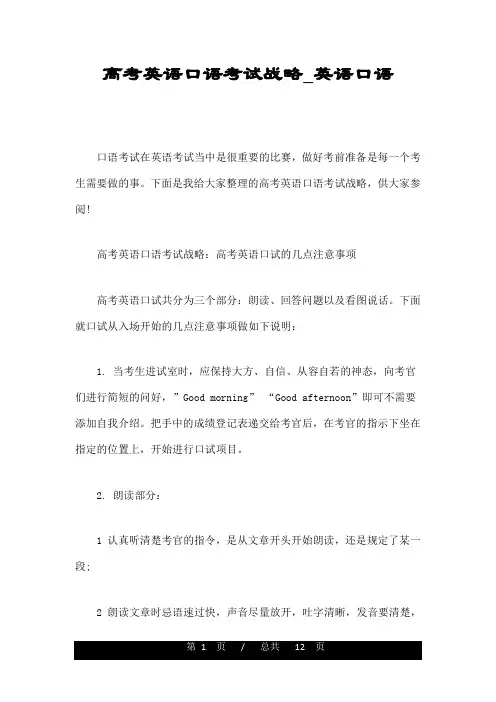
高考英语口语考试战略_英语口语口语考试在英语考试当中是很重要的比赛,做好考前准备是每一个考生需要做的事。
下面是我给大家整理的高考英语口语考试战略,供大家参阅!高考英语口语考试战略:高考英语口试的几点注意事项高考英语口试共分为三个部分:朗读、回答问题以及看图说话。
下面就口试从入场开始的几点注意事项做如下说明:1. 当考生进试室时,应保持大方、自信、从容自若的神态,向考官们进行简短的问好,”Good morning” “Good afternoon”即可不需要添加自我介绍。
把手中的成绩登记表递交给考官后,在考官的指示下坐在指定的位置上,开始进行口试项目。
2. 朗读部分:1 认真听清楚考官的指令,是从文章开头开始朗读,还是规定了某一段;2 朗读文章时忌语速过快,声音尽量放开,吐字清晰,发音要清楚,朗读要流利;3 忌犯科学性的错误,既某些单词的读音把握不准,一定要在候考时查阅字典进行解决。
3. 回答问题:1 尽量用全句来回答问题,可以照着朗读材料来作答;2 考官有可能提出与朗读材料并无任何关联的问题,但贴近生活,如:what is your favorite sport? Why do you like it?/what is your hobby?3 与朗读材料有关的问题通常包括what/why/when/where/who/How开头的特殊疑问句;4 考生必须要注意的题型是:反意疑问句以及选择疑问句。
切记,不要把选择疑问句当成了一般疑问句来作答。
5 听不清或没听懂考官提问,可以说pardon.4. 看图说话1 看图说话,考官发出的指令是talk about the picture;2 语言组织要通顺,说话时不要发出“er..en..”等,且出现长时间的卡壳,所以说话时不要急,切忌语速过快。
3 对优秀的要求是能说到五句话以上,考生尽量用所学过的一些漂亮的短语和词组。
语句上最好能用上几个从句,这方可使考官眼前一亮。

2025年1月上海市春季高考英语仿真模拟试卷02(口试部分)口语模拟试题 test2(口试音频).mp3Test 21.SPEAKINGSection ADirection:Read aloud the following ,two sentences.For each sentence,you will have thirty seconds to prepare and fifteen seconds to read.1."What could be better than no more cast?"asks Bonk.2.Poets and novelists also bore witness to the poverty,hopelessness,and helplessness that was the lot of countless child workers living at the beginning of the 20th century.Section BDirections:Read aloud the following passage.You will have one minute to prepare and thirty seconds to read.An earthquake happens when the earth actually moves under the ground.Many hundreds of earthquakes take place every year,especially under the sea.We don't even know that they are happening.If earthquakes happen in or near large cities,they can cause problems.The moving ground makes buildings shake and fall down.It causes cracks in the ground which may open up into very deep holes.People,animals and objects can fall into these holes and be lost forever.Water,gas and electricity pipes may be damaged.The result is flooding and fire.Fire is the greatest danger during an earthquake,because it can destroy so much in such a short time Section CDirections:Ask two questions about each situation given below.At least one special question should be asked about each situation.Questions 1-2:You want to book a table for today's dinner,so you call the restaurant.Question 1:Question 2:SpeakingQuestions 3--4:Your deskmate is reading a newly-published novel .You ask him about it.Question 3:Question 4:Section DDirections:You will have one minute to prepare and another minute to talk in at least five sentences about the following pictures.Begin your talk with the sentence given:It is March 5th,a day that people are encouraged to do good deeds in memory of Lei Feng.II.LISTENING AND SPEAKINGSection ADirections:In Section A,you will hear four sentences.Make quick responses to the sentences you have heard.1.2.3.4.Section BDirections:In Section B,you will hear a short passage.The passage,will be read twice.After you hear the passage,answer the first question with the information you hear and the second questions in your own opinion with at least3sentences.For the first question,you will have30seconds,to prepare and30seconds to talk.For the second question,you will have one minute to prepare and another minute to talk! Questions:1.What are Bob Martin and Peter Holden respectively interested in?2.What are you or your friend crazy about?Why?录音内容:II.LISTENING AND SPEAKINGSection A1.I'd like to talk about the plan with you.Would tomorrow morning be convenient?2.Where would you like to go for a walk?3.Sorry I didn't quite catch what you said just now.4.I'm so excited that I've finally got the offer!Section BListen to the following speaker talking about two people's interestWhether it’s collecting coins,supporting your favorites football team,or just shopping,most people have some kind of interest But what happens when that interest become the most important thing in your life?Take Bob Martin for example,in1988,he went to see the musical Cats at the New London Theatre.He enjoyed it so much that he went to see it again.And again.And again...every week for fourteen years!He travelled52,000miles and saw the show795times,spending a total of£20,000.K!don't drink,smoke or run a car, so I could just about afford it,"says the71-year-old.But sadly Bob is now looking for a new hobby.The show closed last year after a sixteen-year run in London.For some it's musicals that keep them coming back for more.For others,it's...fast food.Peter Holden,from Washington DC,eats an average of two McDonald's and says,"I'm a collector of the McDonald dining experience."He is1.9meters tall and weighs90kilograms—he says he doesn't put on weight partly because he is lucky and partly because he doesn't eat the fries.参考答案:I.SPEAKINGSection C1.Is there any table available for today’s dinner?2.When should I arrive at the latest?3.Who is the author of the novel?4.What do you think of the novel?Section DIt is March'5th,a day that people are encouraged to do good deeds in memory of Lei Feng.So,in class,the teacher tells the students that each of them should do a good deed.After class,Xiao Ming and Xiao Hong run out of school and look for a chance to do some good deeds.Suddenly,Xiao Ming finds an old lady walking with a stick.It seems that she wants to cross the road.He runs up to her immediately and.offers to help her go across the road.When they arrive at the other side of the road,Xiao Hong,who is following,runs up to the lady at once and says,"Granny,please let me help you cross the road once again.It's our task to do a good deed.Thank you very much."II.LISTENING AND SPEAKINGSection A1.OK.I’m available tomorrow morning./Sorry,I’m busy tomorrow morning.2.How about the park around the corner?/Just along the road to the bus stop.3.That’s all right.I will say it again./Never mind,I can repeat it.4.Congratulations!/Well done!Section B1.Bob Martin is interested in the musical Cats.Peter Holden is interested in McDonald’s meals.2.One of my friends is crazy about collecting hair clips although she doesn't wear them very often.She has a box full of hair clips with different cartoon figures on them,such as Mickey Mouse,Hello Kitty and so on. Why does she like hair clips so much?She says it's because her parents didn't buy her any hair clip when she was a little girl no matter how much she liked it.What a shame!评分标准I.SPEAKINGSection A朗读部分评分标准:(每题1分,共2分)1分能流利朗读命给的句发音清楚;语音语调节奏正确;能正确处理句子重音、意群停顿;并熟练掌握连读、失爆等朗读技巧。
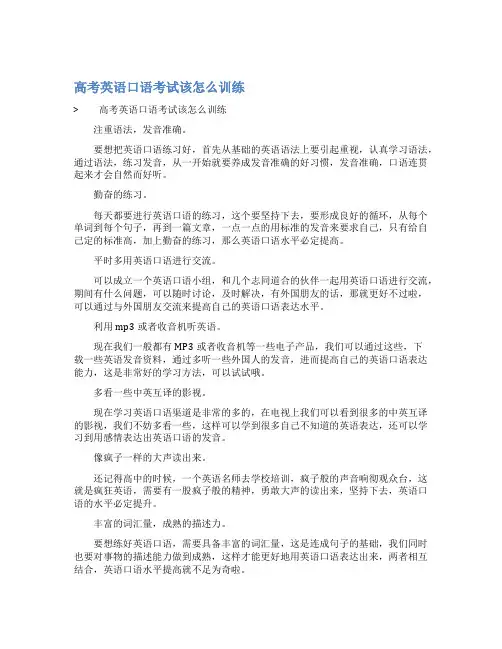
高考英语口语考试该怎么训练>高考英语口语考试该怎么训练注重语法,发音准确。
要想把英语口语练习好,首先从基础的英语语法上要引起重视,认真学习语法,通过语法,练习发音,从一开始就要养成发音准确的好习惯,发音准确,口语连贯起来才会自然而好听。
勤奋的练习。
每天都要进行英语口语的练习,这个要坚持下去,要形成良好的循环,从每个单词到每个句子,再到一篇文章,一点一点的用标准的发音来要求自己,只有给自己定的标准高,加上勤奋的练习,那么英语口语水平必定提高。
平时多用英语口语进行交流。
可以成立一个英语口语小组,和几个志同道合的伙伴一起用英语口语进行交流,期间有什么问题,可以随时讨论,及时解决,有外国朋友的话,那就更好不过啦,可以通过与外国朋友交流来提高自己的英语口语表达水平。
利用mp3或者收音机听英语。
现在我们一般都有MP3或者收音机等一些电子产品,我们可以通过这些,下载一些英语发音资料,通过多听一些外国人的发音,进而提高自己的英语口语表达能力,这是非常好的学习方法,可以试试哦。
多看一些中英互译的影视。
现在学习英语口语渠道是非常的多的,在电视上我们可以看到很多的中英互译的影视,我们不妨多看一些,这样可以学到很多自己不知道的英语表达,还可以学习到用感情表达出英语口语的发音。
像疯子一样的大声读出来。
还记得高中的时候,一个英语名师去学校培训,疯子般的声音响彻观众台,这就是疯狂英语,需要有一股疯子般的精神,勇敢大声的读出来,坚持下去,英语口语的水平必定提升。
丰富的词汇量,成熟的描述力。
要想练好英语口语,需要具备丰富的词汇量,这是连成句子的基础,我们同时也要对事物的描述能力做到成熟,这样才能更好地用英语口语表达出来,两者相互结合,英语口语水平提高就不足为奇啦。
拓展阅读:英语口语对话范文A:hi,Zhou kai ting.What are you doing now ?B:I'm busy with my homework. I have't take a rest for a long time .A: You're so great that I can't help admiring your enthusiasm .What's your schedual like ?B: You know ,I'm a student ,so I take the most time to study .A: When do you get up in the morning ?B: Why do you ask me that foolish question? Y ou should know we students get up about 7:50A: You just said you take the most time to study . Why not get up earlier ?B: It's my special way to save my energy.A: What do you usually do in the morning ?B: I usually play gmes on the Internet .I play the games like crazy .A: Wait ,wait ,wait ,You said that you spend your most time on your study .B: I think to play games can improve my intelligence .A: What do you usually in the afternoon ?B: Oh, I usually go shoping in a whole afternoon . Don't laugh at me ,it's my way to enrich my knowledge .And I think。
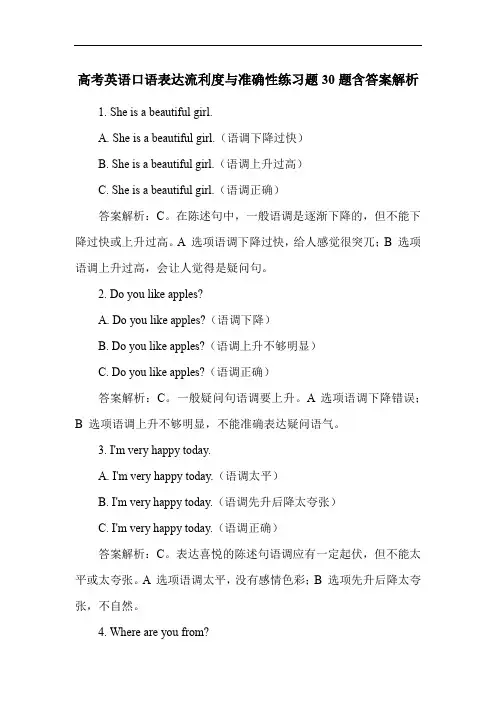
高考英语口语表达流利度与准确性练习题30题含答案解析1. She is a beautiful girl.A. She is a beautiful girl.(语调下降过快)B. She is a beautiful girl.(语调上升过高)C. She is a beautiful girl.(语调正确)答案解析:C。
在陈述句中,一般语调是逐渐下降的,但不能下降过快或上升过高。
A 选项语调下降过快,给人感觉很突兀;B 选项语调上升过高,会让人觉得是疑问句。
2. Do you like apples?A. Do you like apples?(语调下降)B. Do you like apples?(语调上升不够明显)C. Do you like apples?(语调正确)答案解析:C。
一般疑问句语调要上升。
A 选项语调下降错误;B 选项语调上升不够明显,不能准确表达疑问语气。
3. I'm very happy today.A. I'm very happy today.(语调太平)B. I'm very happy today.(语调先升后降太夸张)C. I'm very happy today.(语调正确)答案解析:C。
表达喜悦的陈述句语调应有一定起伏,但不能太平或太夸张。
A 选项语调太平,没有感情色彩;B 选项先升后降太夸张,不自然。
4. Where are you from?A. Where are you from?(语调上升过高)B. Where are you from?(语调下降过早)C. Where are you from?(语调正确)答案解析:C。
特殊疑问句语调一般先上升后下降。
A 选项上升过高,不恰当;B 选项下降过早,不符合规则。
5. He is a good student.A. He is a good student.(语调上升)B. He is a good student.(语调下降过慢)C. He is a good student.(语调正确)答案解析:C。
高考英语口语常见句型90句_英语口语考试常用万能句子高考英语口试考核包含三个组成部分:文章朗读、回答问题、口头作文,下面小编给大家汇总了高考英语口语常见句型,希望能帮助到大家。
高考英语口语常见句型1. I'm an office worker. 我是上班族。
2. I work for the government. 我在政府机关做事。
3. I’m happy to meet you. 很高兴见到你。
4. I like your sense of humour. 我喜欢你的幽默感。
5. I’m glad to see you again. 很高兴再次见到你。
6. I’ll call you. 我会打电话给你。
7. I feel like sleeping/ taking a walk. 我想睡/散步。
8. I want something to eat. 我想吃点东西。
9. I need your help. 我需要你的帮助。
10. I would like to talk to you for a minute. 我想和你谈一下。
11. I have a lot of problems. 我有很多问题。
12. I hope our dreams come true. 我希望我们的梦想成真。
13. I’m looking forward to seeing you. 我期望见到你。
14. I’m supposed to go on a diet / get a raise. 我应该节食/涨工资。
15. I heard that you’re getting married. Congratulations.听说你要结婚了,恭喜!16. I see what your mean. 我了解你的意思。
17. I can’t do this. 我不能这么做。
18. Let me explain why I was late. 让我解释迟到的理由。
2019高考英语口语:That’s all口语用法归纳That’s all口语用法归纳That’s all是口语中一句非常有用的表法,其用法主要有以下三种1. 表示这些或无关紧要,意为:没别的;没事;没什么;事情就是这样。
如A:How are you feeling? 你感觉怎么样?B:Fine. Just a little tired. That’s all. 还好,仅仅有点累,没事。
A:What happened? 怎么啦?B:Well, the wind blew the door open. I’ve closed it, that’s all. 噢,是风把门吹开了,我把它关上了,没事。
Just a funny dream, that’s all. 仅仅做了个有趣的梦,如此而已。
I only dined out with her. That’s all. 我仅仅与她出去吃饭,而已。
It’s a matter of a few more miles, that’s all. 最多再有几英里,也不过如此。
2. 表示沮丧或无可奈何,意为:没有(别的)办法。
如If all the seats are booked, we shall have to stayat home, that’s all. 如果全部戏票都已预售一空,我们只好呆在家里,没有别的办法。
3. 表示说话或做事完了(或暂时完了)。
意为:……完了;……就这些。
如That’s all. thank you. 我的发言完了,谢谢。
That’s all for today. 今天就到这里吧。
That’s all; yo u may go now. 就这些,你能够走了。
2019 高考英语:Yes 在口语中的九种用法1. 用来表示同意对方的说法、猜想、建议、请求等(主要用往返答一般疑问句、反意疑问句、否定疑问句、以及某些含有不确定语气的陈述句等),意为:是的; 对。
如:A:Are you ready? 你预备好了吗?B:Yes, I am. 是的,预备好了。
A:He has got a bike, hasn 't he? 他有辆自行车,是吗?B:Yes, he has. 是的。
A:You can swim, I suppose. 我想你会游泳吧。
B:Yes, I can. 是的,我会。
注:若是回答反面提问(比如:回答否定疑问句或陈述部分为否定式的反意疑问句等),要非凡注重Yes 和No 的用法(表示肯定用Yes, 表示否定用No)与翻译(Yes —般译为“不”而No却通常译为“是的” )与汉语习惯不同:A:Don't you like the book? 你不喜欢这本书吗?B:Yes, I do. 不,我喜欢。
(误译:是的,我喜欢)C:No, I don 't. 是的,我不喜欢。
(误译:不,我不喜欢)A:He hasn't come back, has he? 他还没回来,是吗?B:Yes, he has. 不,他回来了。
(误译:是的,他回来了)C:No, he hasn 't. 是的,他还没回来。
(误译:不,他还没回来)2. 用来应答呼唤,意为:嗳; 我在这儿;有什么事? 如:A:Mary! 玛丽!B:Yes, mother! 我在这儿,妈妈!A:Tom! 汤姆!B:Yes! What do you want? 嗳,你要干吗?A:Waiter! 服务员!B:Yes, sir? 先生,你要什么?3. 用来表示疑问或希望对方进一步讲述(用升调),意为:真的吗? 是吗? (继续)说呀!如:Yes, what happened next? 说呀,后来呢?A:The boy can run 100 metres in eleven seconds. 这男孩跑100米只要11 秒。
What do you think的⼝语⽤法 1. ⽤来询问对⽅的观点或看法等,意为:你说呢? 你认为呢?你怎么看? 如: Is that the right approach?What do you think? 这个办法可⾏吗? 你认为呢? Of course, everyone likes presents. But Mr Green says, "It‘s better to give than to receive. " What do you think? 当然,每个⼈都喜欢礼物,但格林先⽣说“送礼物⽐接受礼物要好”,你说呢? A:What do you think, Jack? Should girls be allowed to wrestle with boys? 杰克,你认为呢? 应该让⼥孩⼦与男孩⼦去摔⾓吗? B:I don‘t see anything wrong with that. 我看这没有什么不好的呀。
注:询问观点或看法的 What do you think? 常可在其后加上 of/about 短语。
如: What do you think of [about] his idea? 你觉得他的想法怎么样? 2. ⽤来询问对⽅的安排或建议,意为:有什么事? 你有何安排? 如: A:Are you free tomorrow? 你明天有空吗? B:I think so. What do you think? 我想有空吧,有什么事? A:What are you going to do on Sunday? 星期天你打算⼲什么? B:I‘ve no idea. What do you think? 还不知道,你有何安排? 3. 表⽰要告诉对⽅⼀个惊奇或意想不到的情况,意为:你猜怎么着? 告诉你⼀件意想不到的事。
如: What do you think? Old Stephen will marry again. 你猜怎么着? ⽼斯蒂芬⼜要结婚了。
高考英语 Speak Englishi :英语口语天天练There's nothing to tell! 没什么好说的。
He's just some guy I work with! 他只是跟我一起工作而已。
Carol moved her stuff out today. 卡罗尔今天把她的东西搬走了。
Did I say that out loud? 我很大声地说了吗?She didn't know, how should I know? 她都不知道,我怎么会知道?I am feeling a lot of pain right now. 我现在很痛苦。
How did you get through it? 你是怎样熬过来的?Why am I doing this, and who am I doing this for? 我为什么要做这个?我又为了谁?Who am I gonna ask? 我应该问谁呢?What if I don't wanna do that? 如果我不做呢?Well, it matters to me! 但对我来说很重要!It's a metaphor. 这只是个比喻。
What does that mean? 那是什么意思?I never made coffee before. 我以前从未煮过咖啡。
Push her down the stairs! 把她推下楼!Put the book back. 把书放回去。
I'm sorry, I didn't catch your name. Paul, was it? 不好意思,我没听清楚你的名字。
“保罗”是吗?I thought he was a good guy. 我以为他是好人。
You are trained for nothing. 你书都白念了。
You(really)know me well. 你真了解我。
高考英语口语:含know口语的用法
1. You know what?
表示有事(通常是说话者认为比较重要的事)要告诉对方,意为:我告诉你吧! 如:
You know what? I think I’ve found a way to make alittle money. 我告诉你吧,我已想到一个赚点钱的办法。
有时也说成 You know something? 或Do you know what?或 Do you know something? 如:
You know something, Mary? Mr Harris is the nicestman I know, except for my father. 我来告诉你吧,玛丽,哈里斯先生是除我父亲之外我所理解的的人。
2. You never know.
用于委婉地表示没有把握,意为:说不准;这事很难说;事情很难预料。
如:
You never know, it may stop raining by tomorrowmorning. 说不定这雨到明天早上就不下了呢。
A:Will you be coming next week? 你下周会回来吗?
B:You never know. 说不定。
A:Do you think he will come to meeting? 你认为他会来参加这个会议吗?
B:You never know, but I hope he will. 这说不定,但我希望他会来。
A:Did he meet her at the party? 他在晚会上见到她了吗?
B:You never know. 不清楚。